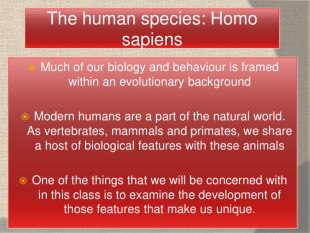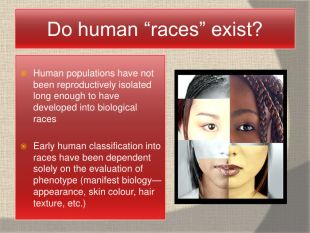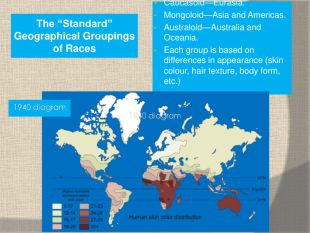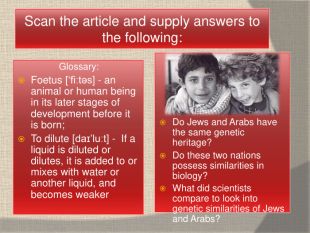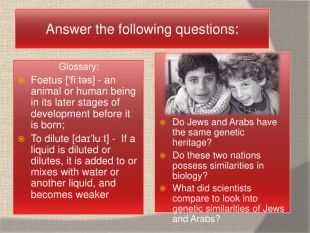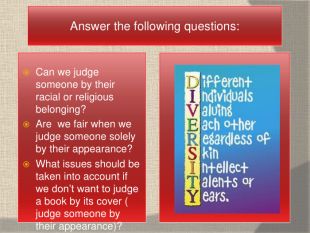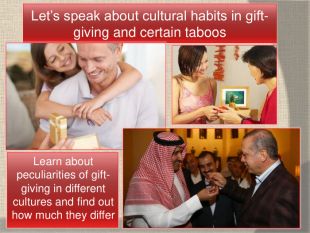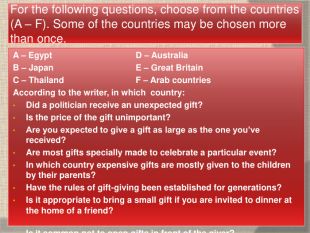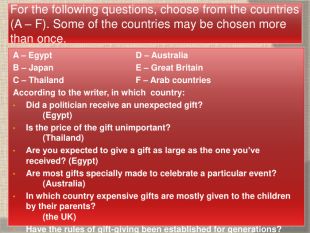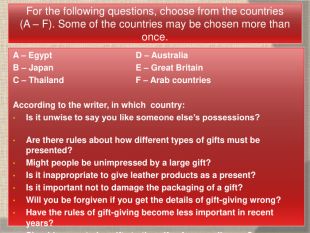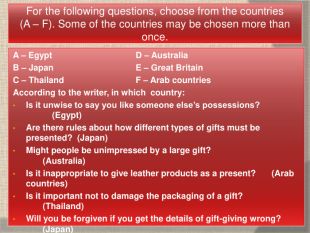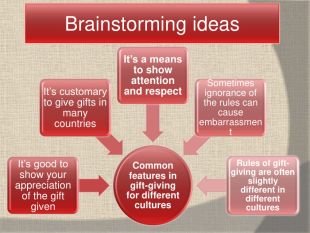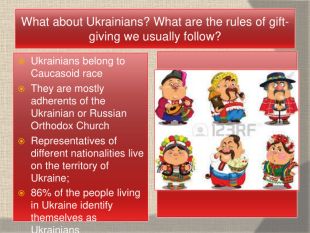Multicultural diversity
Lesson Plan (form 10-A)
Title: Multicultural diversity and rules of gift-giving
Overview
Multiculturalism exists in all countries but the most multicultural countries are: the USA, the UK, Canada and Australia. Theoretically it is accepted in most of the countries. However, it doesn’t happen in practice. Our task is to research and clarify the following things: what do we mean when we speak about race, ethnic group and cultural identity and what factors cause multiculturalism in modern world. The most tricky question is the following: are our habits and culture dependent on how we identify ourselves?
Objectives:
- Do research on the global trends in multiculturalism around the world;
- develop skills needed to respond to critical questions while reading;
- develop vocabulary as well as oral and written skills;
- compare and contrast particular features in gift-giving tradition;
- practise listening for a variety of purposes;
- identify and analyze elements of multiculturalism in different cultures.
Materials:
Power Point Presentation
World map
Teaching texts
Activities:
Introduction
Warm-up: challenging students to give their ideas on multiculturalism (home assignment).
Presentation:
- presenting new vocabulary, providing a lot of context;
- clarifying certain aspects of the lexical units connected with the topic of discussion;
- presenting a short text to introduce the topic of discussion.
Controlled practice:
- presenting a short video on the topic of discussion;
- reading and listening comprehension activities;
- language function practice on specific activities such as speculating to reach a
conclusion.
Free practice:
- class debates;
- discussion focusing on communication skills
- learning a concept through various means.
Feedback:
- checking the students’ understanding of the lesson's topic;
- giving the students the chance to improve their understanding on their own.
The Art of Giving
(Egypt and Arab countries)
When the US President Jimmy Carter visited Egypt in 1978, a camel trader was asked to show him round a camel market. The trader was so honoured that he not only gave the tour, but also presented the president with a six-year-old camel, a pink ribbon tied around its neck. The camel trader’s action was typical of the hospitality and generosity shown in many parts of the Arab world, where good manners are an essential ingredient in a person’s character. And generosity to guests is essential to a good reputation.
Because there are accepted rules of behaviour in gift-giving, the foreign businessperson must be careful. For example, admiring a painting or ornament in a client’s home or office might oblige them to present you with it as a gift. What’s more, your Egyptian colleague will probably begin a round of gift-giving and will expect you to reciprocate, if not immediately, then on the next possible occasion, and the gift should match theirs in size and cost, if possible.
Gift giving is important in the Arab culture, with generosity and politeness being very significant aspects in gift giving. Arabs will normally be the first to present a gift. Whenever possible, reciprocate with gifts of similar quality and value.
Be sure to avoid alcohol and leather products made of pigskin, which are offensive to Muslims. Also avoid giving gifts to the wife of an Arab colleague, and never inquire about her.
Ideas of gifts to present to your colleagues in the Middle East include the highest quality of leather (not pigskin), silver, precious stones, cashmere, crystal or porcelain.
To oblige – make someone legally of morally bound (зобов’язаний) to do something
To reciprocate – respond to a gesture or action by making a corresponding one
The Art of Giving
(Asian countries)
The Arab world is not the only place where gift-giving follows set rules. In Japan they are even stricter. As an American who volunteered to teach English to a Japanese woman reported: “Before each lesson, and on each and every visit, the Japanese lady brought me a gift – a book, some paper sculpture or flowers.” Unknowingly, this American was experiencing a ritual rooted centuries deep in Japanese culture. According to Business Tokyo magazine, among the Japanese “gift-giving is a necessity, not merely a nicety as it is in the West.
In Japan the proper gift is thought to express the giver’s true friendship, gratitude, and respect far better than words can. And specific gift-giving rules have prevailed in Japanese society for centuries. They spell out the type of gift to give and how the various types of gifts should be wrapped. So if you plan to visit Japan, be prepared. But don’t worry about getting the protocol wrong – foreigners are not expected to know all the rules!
Another country which takes gifts seriously is Thailand. When visiting a home in this country, take flowers or a box of chocolates from the local market. The value is not important; it is the thought and the act that count. It is the tradition in Thailand to wrap gifts beautifully with colourful ribbons, and the custom has long been to put the gift aside to be opened later, so don’t be offended if the gift seems to go unappreciated. But this custom is not so rigid today as it was and you may be invited to open a gift in front of the giver. But in this case do avoid ripping off the beautiful wrapping, as this is considered rude.
To spell out – to mean something by a word, text, concept, or action
To prevail – to prove more powerful or superior
To appreciate – to recognize how good someone or something is and to value him, her, or it:
Rigid – firmly fixed or set; also inflexible, strict, or severe
The Art of Giving
(Australia and the UK)
There are countries where businesspeople rarely exchange gifts, and Australia is an example of this. Modest gifts, such as a business diary, a paperweight or a coffee mug might be presented as a memento of a visit or business meeting, and sales conferences and trade shows often give out T-shirts, ties or baseball caps as mementos. However, anything more than these types of gifts could cause embarrassment in a society known for its friendly informality, as people might regard them as pretentious.
When you are in the UK, be aware of the fact that the terms 'English' and 'British' do not mean the same thing. 'British' denotes someone who is from England, Scotland, Wales or Northern Ireland. 'English' refers to people from England. Be sure not to call someone ‘English’ if they are Welsh, Scots or Northern Irish. Gifting in the UK is considered very important by the people. Flowers, cakes, chocolates, sweets, clothes, jewellery and electronic goods are all very commonly given as gifts. Expensive gifts tend only to be given by parents to their children. It is generally considered to be poor form to give expensive gifts in a business or social setting. However, if you are invited to dinner at the home of a friend or business associate, then you should bring a small gift, this is frequently aimed at the woman of the house or the children but it should be of low financial value. Acceptable gifts include: a bunch of flowers, a nice bottle of wine or champagne, something from your home country / culture, a toy appropriate to the ages of the children in the household.
Memento – an object that you keep to remember a person, place, or event
Pretentious – attempting to impress by affecting greater importance or merit than is actually possessed
RACE
a category of humankind that shares certain distinctive physical traits
EVOLUTIONARY BACKDROUND
relating to the way in which living things develop over millions of years and involving a gradual process of change and development
VERTERBRATES [‘vutubreits]
an animal that has a backbone and a skeleton. Such animals also include humans
PHENOTYPE [‘fi:nutaip]
the appearance of an organism resulting from the interaction of the genotype and the environment
GENOTYPE [‘jenutaip]
the genetic makeup of an organism or group of organisms with reference to a single trait, set of traits, or an entire complex of traits
SEGREGATE
to keep one group of people apart from another and treat them differently, especially because of race or sex
DISCRIMINATION
treating a person or particular group of people differently, especially in a worse way from the way in which you treat other people, because of their skin colour, sex, sexuality
AVERSION
a person or thing that causes a feeling of strong dislike or of not wishing to do something
MONOGENISTS
those who believe that the human race has descended from a single pair of individuals or a single ancestral type.
POLYGENISTS
Those who believe that existing human races have evolved from two or more distinct ancestral types
ANCESTOR; ANCESTRAL (adj.)
a person related to you who lived a long time ago; relating to, or inherited from an ancestor
TO BE DESCENDED (active form: to descend)
to be inherited or transmitted, as through succeeding generations


про публікацію авторської розробки
Додати розробку




![Race - a category of humankind that shares certain distinctive physical traits. Evolutionary background – a concept relating to the way in which living things develop over millions of years and involving a gradual process of change and development. Verterbrate [‘vutubreit] -an animal that has a backbone and a skeleton. Such animals also include humans. Phenotype [‘fi:nutaip] - the appearance of an organism resulting from the interaction of the genotype and the environment. Genotype [‘jenutaip] - the genetic makeup of an organism or group of organisms with reference to a single trait, set of traits, or an entire complex of traits Race - a category of humankind that shares certain distinctive physical traits. Evolutionary background – a concept relating to the way in which living things develop over millions of years and involving a gradual process of change and development. Verterbrate [‘vutubreit] -an animal that has a backbone and a skeleton. Such animals also include humans. Phenotype [‘fi:nutaip] - the appearance of an organism resulting from the interaction of the genotype and the environment. Genotype [‘jenutaip] - the genetic makeup of an organism or group of organisms with reference to a single trait, set of traits, or an entire complex of traits](/uploads/files/4856357/443528/504522_images/4.jpg)










![Scan the article and supply answers to the following: Glossary: Foetus [‘fiːtəs] - an animal or human being in its later stages of development before it is born;To dilute [daɪ’luːt] - If a liquid is diluted or dilutes, it is added to or mixes with water or another liquid, and becomes weaker. Do Jews and Arabs have the same genetic heritage?Do these two nations possess similarities in biology?What did scientists compare to look into genetic similarities of Jews and Arabs? Scan the article and supply answers to the following: Glossary: Foetus [‘fiːtəs] - an animal or human being in its later stages of development before it is born;To dilute [daɪ’luːt] - If a liquid is diluted or dilutes, it is added to or mixes with water or another liquid, and becomes weaker. Do Jews and Arabs have the same genetic heritage?Do these two nations possess similarities in biology?What did scientists compare to look into genetic similarities of Jews and Arabs?](/uploads/files/4856357/443528/504522_images/15.jpg)

![Answer the following questions: Glossary: Foetus [‘fiːtəs] - an animal or human being in its later stages of development before it is born;To dilute [daɪ’luːt] - If a liquid is diluted or dilutes, it is added to or mixes with water or another liquid, and becomes weaker. Do Jews and Arabs have the same genetic heritage?Do these two nations possess similarities in biology?What did scientists compare to look into genetic similarities of Jews and Arabs? Answer the following questions: Glossary: Foetus [‘fiːtəs] - an animal or human being in its later stages of development before it is born;To dilute [daɪ’luːt] - If a liquid is diluted or dilutes, it is added to or mixes with water or another liquid, and becomes weaker. Do Jews and Arabs have the same genetic heritage?Do these two nations possess similarities in biology?What did scientists compare to look into genetic similarities of Jews and Arabs?](/uploads/files/4856357/443528/504522_images/17.jpg)

















